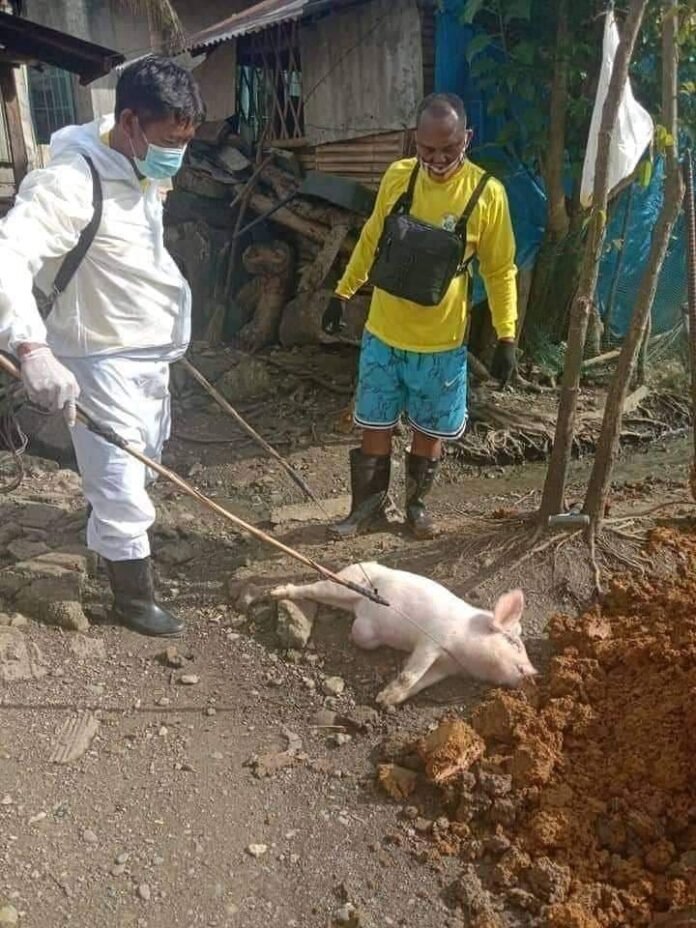By Connie Calipay
LEGAZPI CITY – The Department of Agriculture (DA) regional office in Bicol has noted decreasing cases of African swine fever (ASF) and is set to implement recovery, rehabilitation, and repopulation measures in the region.
Emily Bordado, DA-Bicol spokesperson, in an interview on Monday said the report on the decline in cases was from the Regional Quick Response Team (RQRT) for Animal Disease Emergencies as confirmed by laboratory tests.
“The downtrends of cases were noted from January this year with 76 cases, February — 47 cases, March — 6, April — 3 and May with 2 cases,” she said.
Bordado said since an ASF case was first recorded in Bicol, particularly in Camarines Sur province on Feb. 21, 2020, there have already been 64 affected municipalities in the six provinces of the region.
“This represents 56 percent of the total 114 municipalities. Thirty four (34) municipalities have no reported cases but are considered pink zone or adjacent municipalities to infected zones; 10 are free zones and 6 are protected zones,” she said.
Based on DA records as of last May 24, a cumulative total of 22,026 heads of hogs owned by 3,546 raisers have been depopulated in Bicol. At least 14,296 pigs owned by 2,614 raisers have been indemnified by the agency in the amount of PHP71.4 million.
Bordado said the Department of Budget and Management (DBM) has just released a total of over PHP15 million for the indemnification of the remaining raisers in the region whose hogs were depopulated.
Meanwhile Dr. Edgar A. Madrid, RQRT commander and DA-Bicol regional technical director for research and regulations, in a statement said: “With this slowdown or downtrend, we are now set to implement the Recovery, Rehabilitation, and Repopulation Assistance Program for ASF-affected and non-ASF–affected areas following the guidelines stipulated in Administrative Order No. 6 issued by DA Secretary William D. Dar on Feb. 10 this year.
Madrid said the primary objective of the program is to release an area or zone from “quarantine” following successive negative surveillance results in the quarantine zone; to restore livelihood and economic activities in red zones; increase resilience and capacities of pork producers in managing future disease outbreaks and guide commercial farms in their recovery, rehabilitation and repopulation efforts.
Release from quarantine to recovery would entail compliance with cleaning and proper disinfection procedures and observance of 30 days of downtime to further decrease the area’s bacterial load and the risk of residual ASF virus.
Environmental sampling or bioassay will be conducted through a collection of samples from well water, topsoil, burial site, surfaces of pens, canals, pathways feed, etc. Two screenings a week apart will be done. If results are negative, the farm qualifies to receive sentinel animals.
The initial number of the restocking animals to be distributed through eligible beneficiaries shall be determined by the technical working group created by the DA regional office for the purpose.
The RQRT Bicol has initially identified and classified 14 ASF-infected municipalities which have no reported ASF case for the past 90 days as gray zones, where environmental samples were taken and tested.
“The last province to be infected by the ASF is the island province of Masbate but the spread of the disease was immediately effectively contained and limited to only three municipalities and 10 barangays after Regional Executive Director Rodel P. Tornilla immediately deployed two teams of technical staff who assisted in the monitoring, surveillance, depopulation, and information dissemination campaign,” Bordado said. (PNA)























